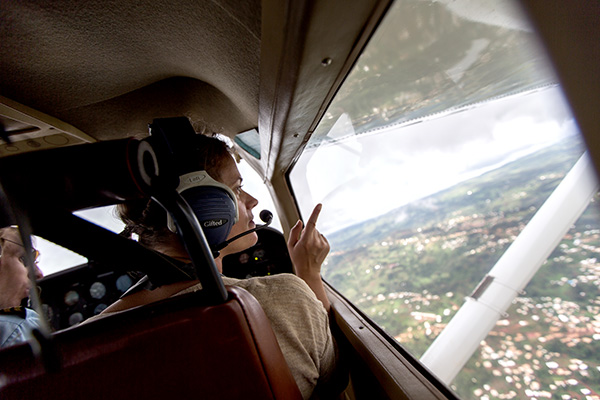A Seamless Transition From the Military to Missions

“Christians in the military stay in their professions because they feel like they are serving something bigger than themselves, they’re making a difference,” says Tom Crabtree, former military and current director of SIL* Nigeria. “Military personnel think, ‘I’m not just earning money; I’m contributing to something I believe in.’ As I entered missions, I had a similar perspective: I thought about missions as going on deployment for the Lord.”
Tom and his wife, Robyn, member care facilitator for SIL Nigeria, were deployed to Panama following Tom’s graduation from West Point. In Panama they became acquainted with Wycliffe missionaries and wondered if God would someday call them into missions. They believed that, wherever they were assigned throughout Tom’s military career, they were sent there by God, and they engaged in ministry through the chapel on base and other organizations that served the military.
As they approached retirement, they asked others to pray where God might be calling them to serve next. After placing their resume with the Finishers Project, an organization that connects adults to missions as a second short-term or long-term career, a Wycliffe recruiter reached out to them. He told them Wycliffe had a desperate need for administrators. “We decided we would walk through the door until God closed it,” says Robyn. “Now we are serving in Nigeria, exactly where we are supposed to be.”
The hard skills that the military has trained service personnel for are especially needed in Wycliffe USA. “When military personnel are preparing to retire or leave, they often think first in terms of how their skills, education and training could fit into a job,” says Chuck Micheals, director for management and professional recruitment for Wycliffe USA. “Missions has many parallels to military jobs in similar areas — you do the same type of work but in a missions environment.”
Tom’s leadership skills have translated well. “It was an 80 percent fit with the kind of things I did in the army,” Tom says. Kevin Tillett, a Wycliffe member serving with JAARS* as a flight coordinator, had been trained as an aviation technician in the service. “It was a great encouragement to realize I could use what I learned in the military — both technical and leadership skills — to serve in missions.”
“Wycliffe needs people who can plug and play, and former military members can do that,” says Chuck. “Wycliffe often doesn’t have the time or finances to train someone in a particular field; they need highly skilled people who are able to step in and do the work immediately.”
Some in the military have a linguistics background already. Those who developed language acquisition skills at the Defense Language Institute Foreign Language Center in Monterey, California, and have been living and working in a particular environment can often transition into Wycliffe work in the same area of the world. Or the GI Bill may pay for others to get training at the Dallas International University.


“God has already given pilots the training needed to plug right into helicopters or planes,” says Kevin. “JAARS itself started with men hired from the military in 1948 after World War II.” But just as important as the hard skills military personnel possess is the unique mindset that makes them a great fit for missions, say the Crabtrees and other former military members. They have experience living cross-culturally. They are flexible and willing to make transitions. Those who have served in the military know how to get plugged in and make friends and create family wherever they are. And they are already raising third-culture kids.
Wycliffe USA currently has hundreds of open positions in human resources, management and administration globally. Jamie Farr, an executive leader within Wycliffe USA observed, “Project management and oversight is a growing need across the organization, and military members are used to executing plans and seeing them through to completion.”
Military personnel understand cross-cultural leadership and are adept at figuring out the power structure in different settings and how to work within it. They are trained to work from a position of service rather than power in working with nationals.
“We are used to working in teams, to solving people problems,” says Tom. “And we are used to living in places with fewer resources than the U.S. For instance, having been an engineer in the Army gave Tom experience dealing with generators, which comes in handy in Nigeria.
Military personnel also understand the need to figure out a plan as you go. “No one is explaining a step-by-step process to you before you do it,” says Tom. “As a leader in the military, you’re used to solving those types of problems.” Military members know how to think on their feet to complete a mission even if they don’t have all the resources.
Those entering mission service for the first time face many issues and obstacles: concerns for personal safety, the loss of friends and community, how to handle their children’s education, the negative reaction of family members who think the decision is a mistake, and the unhappiness of those at home when locations or missions must be kept secret due to security concerns.

Wycliffe provides help with all these issues as people transition into missions, but since military personnel have already dealt with and lived through them, they can move forward in missions more quickly. For those retiring from the military, their funding and healthcare needs are covered so they can transition right away to meet urgent short-term needs.
“Military people are uniquely trained to move into missions and make the transition well,” says Robyn Crabtree. “If you’ve done well in the military, moving into missions is practically seamless. It’s just a new subculture to get used to. God was preparing you for something in military life — consider missions.”
To hear more of Tom and Robyn’s story, watch this webinar.






